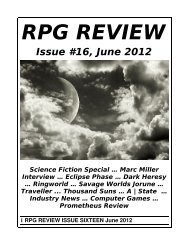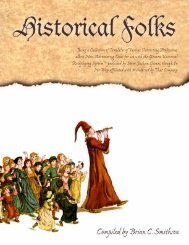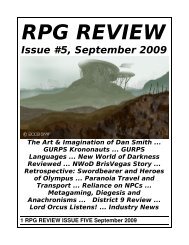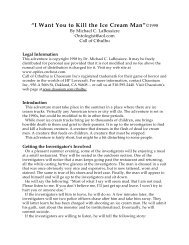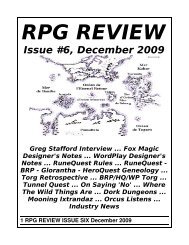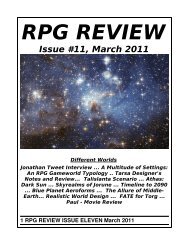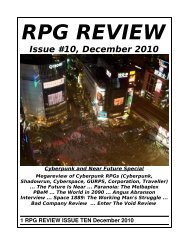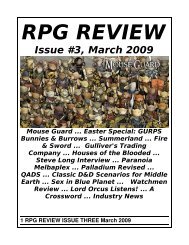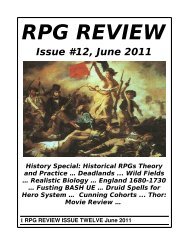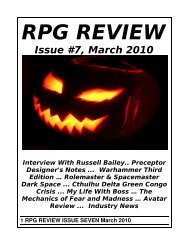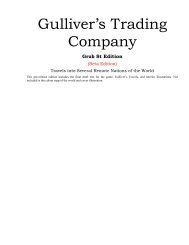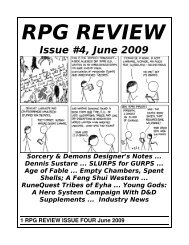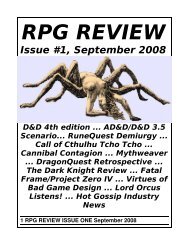seventeenth issue - RPG Review
seventeenth issue - RPG Review
seventeenth issue - RPG Review
Create successful ePaper yourself
Turn your PDF publications into a flip-book with our unique Google optimized e-Paper software.
sustainability), and sorcery ("study and comprehension of how the Runes work.. emulating a Rune... strength from<br />
flexibility). The runes are explained as the sources of power and differentiated by elements (earth, air, fire, etc), forms<br />
(beast, man, chaos, dragon, spirit, etc), the paired opposites of power runes (deathfertility, fateluck, movementstasis),<br />
and conditions (magic, mastery, infinity, etc). Characters become "runetouched" by initiation, spirit dreams, studious<br />
insight etc., providing a runic power with visible effects. Typically cast with a related skill, spells can often be resisted<br />
by persistence or resilience skills checks.<br />
Characters impart energy via magic points, equal to their POW, and regain this every twelve hours, or six if resting<br />
which is certainly quite fast. Magic is rated in order of magnitude, the power and the magic point cost behind the spell.<br />
Common magic is relatively cheap and easy to learn, consisting of about sixty quick utility spells (befuddle,<br />
bladesharp, disruption, heal, second sight, etc) that were once called "battle magic", "spirit magic", or even "rune<br />
magic" in prior editions. Spirit magic now is the location and binding of spirits (limited by cult rank and CHA), whilst<br />
divine and sorcery magics are as per prior editions. Divine magic is powered by "dedicated POW", reducing the amount<br />
of free magic points that the character can use, but providing a pool from which the divine spells can be cast. Divine<br />
spells, of which around fifty are described, are particularly noted for their power, and the size of the pool is limited by<br />
the standing of the character within the cult. In contrast, sorcerers have a grimoire skill for each book from the selection<br />
of around forty spells, and are limited by their INT on how many they can hold in their memory at any one point in<br />
time. Their ability to modify spells depends on the manipulation skill, which determines limits to changes to<br />
magnitude, range, duration, targets, and combination.<br />
Cults, Heroic Abilities, Creatures, and GMs<br />
Cults are those organisations which provide influence, magic, and training in return for devotion and donations, and are<br />
associated with compatible runes. Cults also have mythologies, which a character can call upon (using their culture<br />
skill) to gain inspiration (e.g., bonuses to skill rolls) and insight. Three sample cults are offered, which descriptions of<br />
their associated runes, magic, skills, core myths, and membership. These include Orlanth The Dragon (a theist cult),<br />
The Fire Dancer (a spirit cult), and the Black Serpent (a sorcery cult). Of particular note here is how the game includes<br />
a stepbystep process on how to interact with a myth through a cultic ritual finally some core rules in print for<br />
HeroQuesting!<br />
Derived from the previous edition of RuneQuest, the next chapter include examples Heroic Abilities, extraordinary<br />
abilities that require Hero Points, and minimum ability scores. These are effectively superhuman feats, and could be<br />
just as easily represented by extraordinary skill tests. Hero Points are better spent on narrative effects. Immediately<br />
following, the creatures chapter notes the classic distinction in RQ between variable intelligence and fixed intelligence,<br />
and provides a small collection of creature traits (dark sight, poison, etc), before allocating a page each (with far too<br />
much white space) to a short collection of a mere twentyone creatures with Gloranthan flavour (alas, no ducks, nor<br />
rubble runners).<br />
The final chapter on Gamesmastering, is a short set of advisory notes, which starts with emphasising the core themes of<br />
RuneQuest being community, magic, quests, and cults. In terms of plot development, it offers the succinct objective of<br />
"a good story, well told", before moving into the support material for campaign planning, bookkeeping, and the<br />
dramatic moments of risk. A selection of scenario aids is offered as well, including weather, travel conditions and<br />
expenses, and encounter tables.<br />
Evaluation<br />
Mongoose RuneQuest II is a significant improvement from its predecessor, and the ratings provided reflect that<br />
50 <strong>RPG</strong> REVIEW ISSUE SEVENTEEN September 2012



